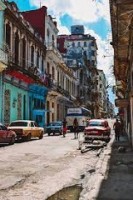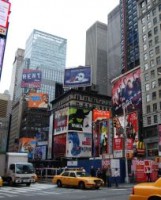Private guides and guided tours in Cuba
Private guides in Cuba
Travel Agency in Havana - Stefano
(Member Since 2017) Languages: Spanish, English, ItalianOur company was created in 2014 and has been growing very fast during the past 2 years. We offer chauffeured vintage car services for daily and multi - day rentals, transfers & tours in Havana City and all around Cuba as well as private guides for many different tours.
Private Guide in Bayamo - Anley
(Member Since 2012) Languages: English, Spanish, French, Dutch, DeutschI work as Private Travel Agent, also as a tour guide, Spanish Teacher, Dancing Teacher, and if you like to learn how to play the bongoes, I will arrange it for you with a professional teacher, I live in Bayamo,in the eastern portion of Cuba but I have other associates spread all around the country that will provide a very nice service that you request.
Private Guide in Havana - Cuba
(Member Since 2005) Excursions/tous in the following cities: Havana Languages: EnglishIf you are an American who is planning a trip to Cuba, you've just found the right travel agency. More than 100,000 Americans visited Cuba last year, Cuba is among the world's fastest growing travel...

Cuba
Language: Spanish
Currency: Cuban peso (CUP)
Calling Code: +53
CAPITAL CITY OF Cuba: Havana
LANGUAGE OF Cuba: Spanish
CURRENCY OF Cuba: Cuban peso (CUP)
COMMENTS ABOUT Cuba:
Cuba is the largest Caribbean island, between the Caribbean Sea and the North Atlantic Ocean.
Cities : Havana (capital), Baracoa, Pinar del Rio, Santa Clara, Santiago de Cuba, Trinidad
Best Places : Baracoa, Cayo Largo, Holguin, Jardines del Rey, Maria la Gorda, Varadero, Vinales
Electricity : 110V/60Hz or 220V/60Hz (North American, European, or Italian plug)
Calling Code : +53
Time Zone : UTC -5
The native Amerindian population of Cuba began to decline after the European discovery of the island by Christopher COLUMBUS in 1492 and following its development as a Spanish colony during the next several centuries. Large numbers of African slaves were imported to work the coffee and sugar plantations and Havana became the launching point for the annual treasure fleets bound for Spain from Mexico and Peru. Spanish rule was severe and exploitative and occasional rebellions were harshly suppressed. It was US intervention during the Spanish-American War in 1898 that finally overthrew Spanish rule. The subsequent Treaty of Paris established Cuban independence, which was granted in 1902 after a three-year transition period. Fidel CASTRO led a rebel army to victory in 1959; his iron rule has held the regime together since then. Cuba's Communist revolution, with Soviet support, was exported throughout Latin America and Africa during the 1960s, 1970s, and 1980s. The country is now slowly recovering from a severe economic recession in 1990, following the withdrawal of former Soviet subsidies, worth $4 billion to $6 billion annually. Cuba portrays its difficulties as the result of the US embargo in place since 1961. Illicit migration to the US - using homemade rafts, alien smugglers, air flights, or via the southwest border - is a continuing problem. Some 2,500 Cubans attempted the crossing of the Straits of Florida in 2003; the US Coast Guard apprehended about 60% of the individuals.
CLIMATE OF Cuba: tropical; moderated by trade winds; dry season (November to April); rainy season (May to October)
RELIGION OF Cuba: nominally 85% Roman Catholic prior to CASTRO assuming power; Protestants, Jehovah's Witnesses, Jews, and Santeria are also represented
POPULATION OF Cuba: 11,308,764 (July 2004 est.)>>
ECONOMY OVERVIEW OF Cuba: The government continues to balance the need for economic loosening against a desire for firm political control. It has undertaken limited reforms to increase enterprise efficiency and alleviate serious shortages of food, consumer goods, and services. A major feature of the economy is the dichotomy between relatively efficient export enclaves and inefficient domestic sectors. The average Cuban's standard of living remains at a lower level than before the depression of the 1990s, which was caused by the loss of Soviet aid and domestic inefficiencies. The government reluctantly allows a large dollar market sector, fueled by tourism and remittances from Cubans abroad.



 French
French Spanish
Spanish Russian
Russian

















